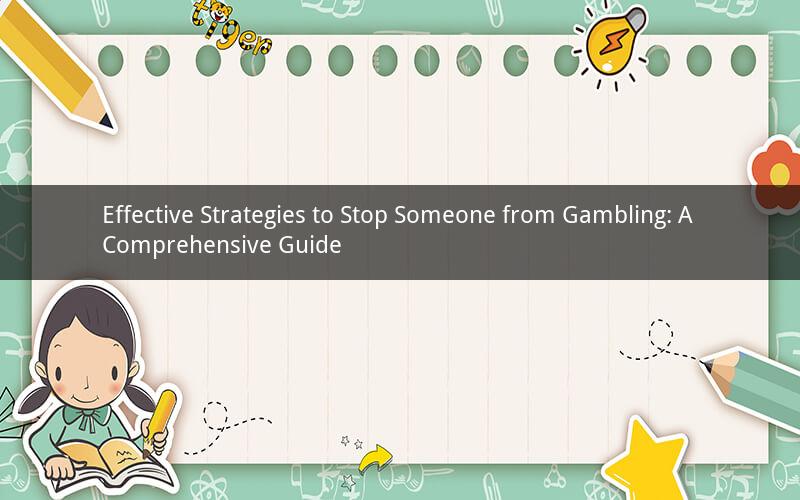
Gambling addiction is a serious issue that affects millions of people worldwide. It can lead to financial, emotional, and social problems, not only for the individual but also for their family and friends. If you know someone who is struggling with gambling addiction, it's important to take action to help them overcome this destructive habit. In this article, we will discuss various strategies to stop someone from gambling, including understanding the addiction, communication, support, and professional help.
Understanding the Addiction
Before you can help someone stop gambling, it's essential to understand the nature of the addiction. Here's a closer look at some key points:
1. What is gambling addiction?
Gambling addiction, also known as compulsive gambling, is a behavioral disorder characterized by an inability to control the urge to gamble, despite negative consequences. It can be classified as a mental health disorder and is often associated with other addictive behaviors.
2. Risk factors for gambling addiction
Several factors can contribute to the development of gambling addiction, including genetics, personality traits, and environmental influences. Some individuals may be more susceptible to developing an addiction due to their genetic makeup or family history.
3. Signs and symptoms of gambling addiction
Identifying the signs and symptoms of gambling addiction is crucial in determining whether someone is struggling with this problem. Common signs include hiding gambling activities, lying about gambling habits, spending excessive amounts of time and money on gambling, and experiencing emotional and financial distress as a result.
Communication
Open and honest communication is vital in helping someone overcome their gambling addiction. Here are some tips for effective communication:
1. Approach the topic with empathy
When discussing the issue of gambling addiction with someone you care about, it's important to approach the topic with empathy and understanding. Avoid judgment or confrontation, as this may make the person feel defensive and less likely to seek help.
2. Express your concerns
Clearly communicate your concerns about their gambling habits and the negative consequences it's causing. Use "I" statements, such as "I am worried about you" or "I am concerned about the money you're spending on gambling," to avoid sounding accusatory.
3. Encourage them to seek help
Encourage your loved one to seek professional help for their gambling addiction. Offer to accompany them to counseling sessions or support groups, and let them know that you are there to support them throughout their recovery journey.
Support
Support from friends, family, and professionals can make a significant difference in someone's recovery from gambling addiction. Here are some ways to provide support:
1. Encourage participation in support groups
Support groups, such as Gamblers Anonymous, can provide individuals with a sense of community and understanding from others who have faced similar challenges. Encourage your loved one to attend these meetings and connect with others who are going through the same struggles.
2. Help them create a budget
If your loved one is struggling with financial consequences of their gambling addiction, help them create a budget to manage their expenses and prioritize essential needs. This can help reduce the temptation to gamble.
3. Monitor their progress
Stay involved in your loved one's recovery journey by monitoring their progress and providing ongoing support. Offer encouragement and celebrate their successes, no matter how small.
Professional Help
Seeking professional help is often the most effective way to overcome a gambling addiction. Here are some options for professional treatment:
1. Therapy
Cognitive-behavioral therapy (CBT) and other forms of therapy can help individuals identify and change the thoughts and behaviors that contribute to their gambling addiction. A therapist can also provide coping strategies and support throughout the recovery process.
2. Medication
In some cases, medication may be prescribed to help manage the symptoms of gambling addiction. However, medication alone is typically not sufficient for recovery and should be used in conjunction with therapy and support.
3. Inpatient or outpatient treatment
Inpatient and outpatient treatment programs can provide a structured environment for individuals struggling with gambling addiction. These programs often include therapy, support groups, and educational workshops to help individuals develop the skills needed to overcome their addiction.
Frequently Asked Questions
Q1: Can someone overcome a gambling addiction on their own?
A1: While it's possible for some individuals to overcome a gambling addiction without professional help, the chances of successful recovery are significantly higher when seeking support from friends, family, and professionals.
Q2: How long does it take to recover from a gambling addiction?
A2: The duration of recovery from a gambling addiction varies from person to person. Some individuals may experience immediate improvement, while others may require ongoing support and treatment for several years.
Q3: Can a person with a gambling addiction ever gamble again?
A3: Recovery from a gambling addiction does not mean a person can never gamble again. Instead, it's about developing healthy gambling habits and maintaining self-control to prevent relapse.
Q4: What should I do if my loved one refuses to seek help for their gambling addiction?
A4: If your loved one refuses to seek help, it's important to continue offering support and expressing your concerns. Consider seeking advice from a professional counselor or therapist who can provide guidance on how to handle this situation.
Q5: How can I help a friend or family member who has lost a significant amount of money due to gambling?
A5: Help your friend or family member by offering emotional support, helping them create a budget, and encouraging them to seek professional help. If necessary, you can also help them explore options for debt counseling or financial assistance.